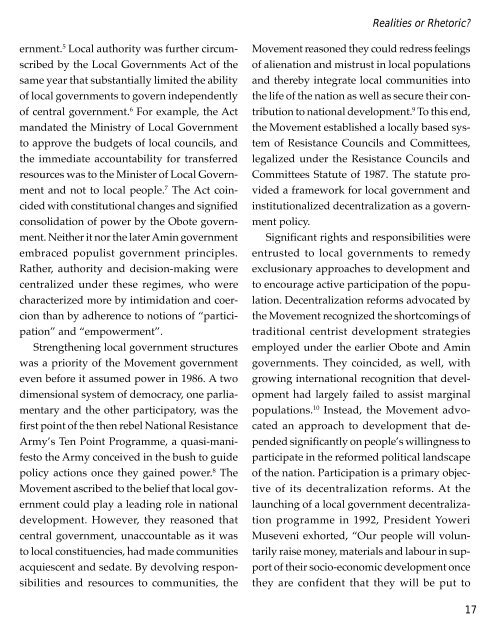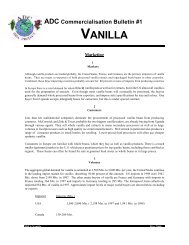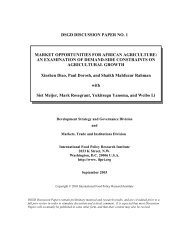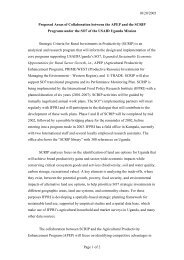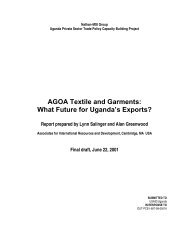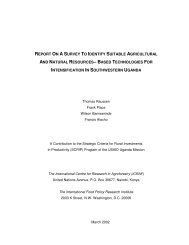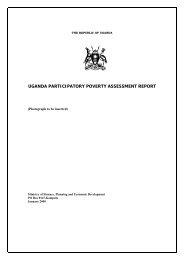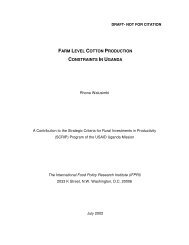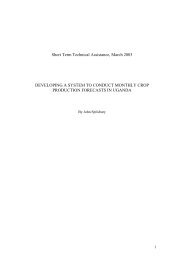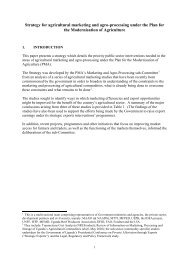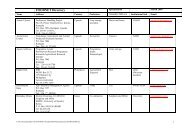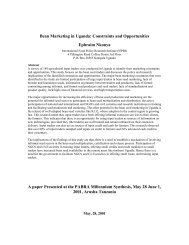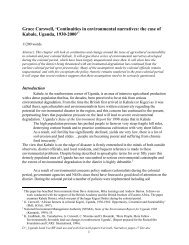Decentralisation in Uganda Rhetoric-Chapter3. - Foodnet
Decentralisation in Uganda Rhetoric-Chapter3. - Foodnet
Decentralisation in Uganda Rhetoric-Chapter3. - Foodnet
Create successful ePaper yourself
Turn your PDF publications into a flip-book with our unique Google optimized e-Paper software.
ernment. 5 Local authority was further circumscribed<br />
by the Local Governments Act of the<br />
same year that substantially limited the ability<br />
of local governments to govern <strong>in</strong>dependently<br />
of central government. 6 For example, the Act<br />
mandated the M<strong>in</strong>istry of Local Government<br />
to approve the budgets of local councils, and<br />
the immediate accountability for transferred<br />
resources was to the M<strong>in</strong>ister of Local Government<br />
and not to local people. 7 The Act co<strong>in</strong>cided<br />
with constitutional changes and signified<br />
consolidation of power by the Obote government.<br />
Neither it nor the later Am<strong>in</strong> government<br />
embraced populist government pr<strong>in</strong>ciples.<br />
Rather, authority and decision-mak<strong>in</strong>g were<br />
centralized under these regimes, who were<br />
characterized more by <strong>in</strong>timidation and coercion<br />
than by adherence to notions of “participation”<br />
and “empowerment”.<br />
Strengthen<strong>in</strong>g local government structures<br />
was a priority of the Movement government<br />
even before it assumed power <strong>in</strong> 1986. A two<br />
dimensional system of democracy, one parliamentary<br />
and the other participatory, was the<br />
first po<strong>in</strong>t of the then rebel National Resistance<br />
Army’s Ten Po<strong>in</strong>t Programme, a quasi-manifesto<br />
the Army conceived <strong>in</strong> the bush to guide<br />
policy actions once they ga<strong>in</strong>ed power. 8 The<br />
Movement ascribed to the belief that local government<br />
could play a lead<strong>in</strong>g role <strong>in</strong> national<br />
development. However, they reasoned that<br />
central government, unaccountable as it was<br />
to local constituencies, had made communities<br />
acquiescent and sedate. By devolv<strong>in</strong>g responsibilities<br />
and resources to communities, the<br />
Realities or <strong>Rhetoric</strong>?<br />
Movement reasoned they could redress feel<strong>in</strong>gs<br />
of alienation and mistrust <strong>in</strong> local populations<br />
and thereby <strong>in</strong>tegrate local communities <strong>in</strong>to<br />
the life of the nation as well as secure their contribution<br />
to national development. 9 To this end,<br />
the Movement established a locally based system<br />
of Resistance Councils and Committees,<br />
legalized under the Resistance Councils and<br />
Committees Statute of 1987. The statute provided<br />
a framework for local government and<br />
<strong>in</strong>stitutionalized decentralization as a government<br />
policy.<br />
Significant rights and responsibilities were<br />
entrusted to local governments to remedy<br />
exclusionary approaches to development and<br />
to encourage active participation of the population.<br />
Decentralization reforms advocated by<br />
the Movement recognized the shortcom<strong>in</strong>gs of<br />
traditional centrist development strategies<br />
employed under the earlier Obote and Am<strong>in</strong><br />
governments. They co<strong>in</strong>cided, as well, with<br />
grow<strong>in</strong>g <strong>in</strong>ternational recognition that development<br />
had largely failed to assist marg<strong>in</strong>al<br />
populations. 10 Instead, the Movement advocated<br />
an approach to development that depended<br />
significantly on people’s will<strong>in</strong>gness to<br />
participate <strong>in</strong> the reformed political landscape<br />
of the nation. Participation is a primary objective<br />
of its decentralization reforms. At the<br />
launch<strong>in</strong>g of a local government decentralization<br />
programme <strong>in</strong> 1992, President Yoweri<br />
Museveni exhorted, “Our people will voluntarily<br />
raise money, materials and labour <strong>in</strong> support<br />
of their socio-economic development once<br />
they are confident that they will be put to<br />
17


